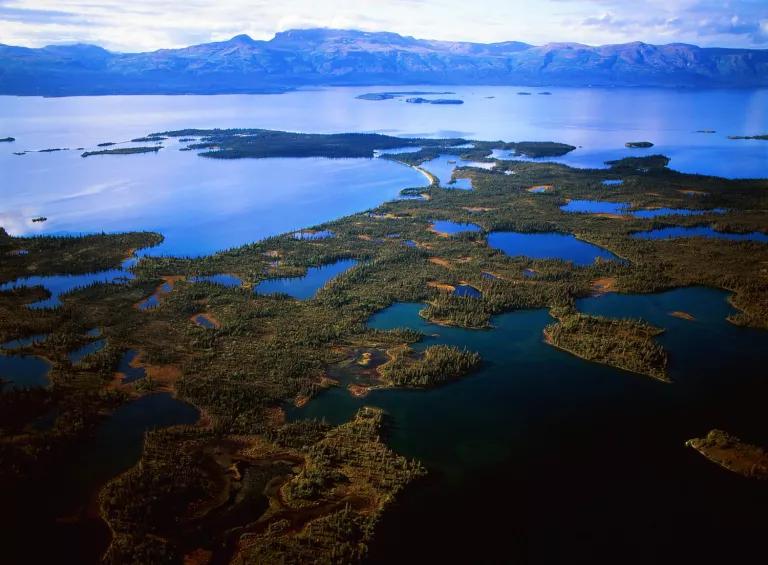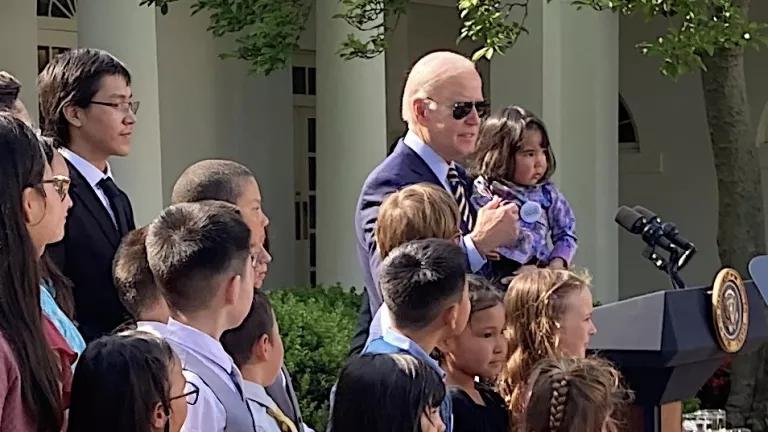EPA Blocks Pebble Mine with Rare Veto. What Happens Next?
Following EPA’s grant of Bristol Bay Tribes’ petitions for veto of destructive mining scheme in Bristol Bay headwaters, underfunded Canadian project owner hopes to overturn or circumvent lengthy agency review.

Twin Lakes, Bristol Bay Region
On January 30, 2023, after over a dozen years of administrative review, the U.S. Environmental Protection Agency (“EPA”) vetoed the proposed Pebble Mine, granting petitions filed in 2010 under Clean Water Act section 404(c) by Bristol Bay Tribes with support from an unprecedented coalition of stakeholders in the region, in Alaska, in the lower 48 states, and around the world. At the heart of the agency’s review and its decision this week lies protection of the world’s most productive wild salmon fishery—generating $2.2 billion in annual revenue, 15,000 jobs, and over 80 million fish this past summer alone—and the people, tribal communities, and wildlife that it has supported for millennia.
EPA’s action is a major milestone and an essential victory in a multi-decade effort to secure lasting protection for a natural, cultural, and economic resource the world cannot afford to lose. We are proud that NRDC and its 3,000,000 members and activists have been fighting this reckless project since 2009, and we have committed ourselves and our resources to continue the battle for as long as it takes to defend the Bristol Bay region from one of the most widely condemned mining projects anywhere.
Justifiably, EPA’s decision has been greeted by the people of Bristol Bay and their supporters with joy and relief at the outcome, with gratitude to the agency, and with celebration at the success of our own advocacy. In the 50-year history of the Clean Water Act, EPA has issued a section 404(c) veto just fourteen times, and none has been overturned.
Yet, despite its singular importance, we understand that EPA’s veto of the Pebble Mine is not the end of the road, that the fight for Bristol Bay will go on. The need for vigilance remains.
Here’s why, and here’s what happens next:
First, the project’s 100 percent owner Northern Dynasty Minerals (with its wholly owned subsidiary the Pebble Partnership) (“Pebble”) has no other assets than the Pebble Mine, and it will never give up its fight. Northern Dynasty was created for the sole purpose of exploring the Pebble project and creating a mining partnership to build and operate it. But beginning in 2011 all of Northern Dynasty’s partners and major mining company investors (Mitsubishi Corporation in 2011, Anglo American in 2013, and Rio Tinto in 2014) abandoned the project, leaving Northern Dynasty underfunded and on its own, where it has remained ever since.
Second, alleging unfairness and a litany of specious legal claims, Pebble is preparing to sue EPA. According to Northern Dynasty’s January 2023 Corporate Presentation, the agency’s decision is “premature and pre-emptive,” “legally and technically indefensible,” the product of a “conspir[acy] with environmental activists,” and based on “wildly speculative claims” that are “not supported by any defensible data.” The company charges that EPA unlawfully discounted the “indisputable,” “overwhelmingly positive socio-economic benefits” of the Pebble project—never mind the existential risk that, according to the scientific record, it poses to the existing multi-billion-dollar Bristol Bay wild salmon fishery. If the company loses its still pending administrative appeal of the Trump Administration’s November 2020 Army Corps of Engineers (“Army Corps”) permit denial, Pebble has promised to sue that agency, too.
In other words, Pebble’s next step is to federal court, with litigation against both of the federal agencies that, after lengthy scientific reviews, have rejected its project. And the State of Alaska, led by longtime Pebble enabler Governor Mike Dunleavy, is likely either to join those lawsuits or bring its own. Whenever litigation is filed, NRDC will be there to defend the federal agency’s actions.

Nushagak River, Bristol Bay Region
Third, Pebble will intensify its self-promotional public relations claiming its project and its copper production are essential to (1) building “America’s Green Future” and (2) ensuring a “domestic solution to U.S. foreign supply chain dependence” for critical minerals. Neither claim stands scrutiny. Indeed, in the infamous September 2020 “Pebble Tapes,” Northern Dynasty CEO Ron Thiessen and former Pebble Partnership CEO Tom Collier were caught on videotape seeking to interest potential Chinese government investors in its project, only to find that they were pitching instead to two undercover investigators for the non-profit Environmental Investigation Agency. Two days after the videotapes were made public, Collier resigned.
More broadly, such claims simply defy reality. The Pebble Mine has generated so much opposition precisely because of its destructive impacts on nature, the environment, and the communities that depend on them. The notion that this reckless scheme can be reconciled with any reasonable understanding of “green” is a perversion of both the term itself and the future to which people aspire—where clean water, oceans, rivers, lakes, and streams abound, biodiversity thrives, and lands and open space are protected from toxic contamination generated by a mining company that allows its own financial gain to trump the public interest.
Similarly, the argument that this country’s access to critical minerals depends on permitting of Pebble’s reckless scheme necessarily assumes that no place on Earth, no matter how special, is safe from destructive mining. Virtually every year the Bristol Bay watershed generates record runs of wild salmon, including this past summer’s 80 million fish. The region is considered a national treasure for good reason, and protection of that resource dictates that mining companies look elsewhere for ore. Mitsubishi, Anglo American, and Rio Tinto long ago understood this when they abandoned the Pebble project; Northern Dynasty never has.
Fourth, this financially challenged company will continue its search for new investors. Indeed, just this month, Northern Dynasty has appeared at investor conferences in Toronto and Vancouver, with further appearances scheduled in the coming months. In July 2022, agreeing to cede a sizable chunk of its anticipated revenue stream should its project ever see the light of day, Pebble struck a deal with an un-named “royalty holder” to generate an influx of cash to pay its monthly legal bills and other costs of staying afloat. And, to the continuing chagrin of the company’s existing shareholders, the dilution of existing stock by the sale of new shares remains a fundraising option, as it has been for years.
Notably, since Rio Tinto’s departure in 2014, Northern Dynasty has been unable to interest any new mining partners or major mining company investors in the Pebble project. The company came close in December 2017 with First Quantum Minerals on the brink of signing a partnership agreement reportedly worth more than a billion dollars, but negotiations were terminated in May 2018 and, to our knowledge, have never resumed. Even the mining industry has learned that, where Pebble is concerned, it’s “sensible to be skeptical.”
Fifth, despite being a wholly owned foreign corporation, Pebble is expected once again to solicit a helping hand in the now narrowly Republican majority House of Representatives. In 2019, before it fell into disfavor even with the Trump Administration, Pebble was the biggest spender in the mining sector on Washington, D.C. lobbyists. Since then, short on cash, facing Democratic majorities on both sides of Capitol Hill, and denied a permit even by the Trump Administration’s Army Corps, that expenditure line has disappeared from the company’s annual budgets.
But don’t be shocked if Pebble now tries to generate interest on the House Science and Technology Committee, for example, in attacking EPA for the veto it issued today or the Army Corps for denying a permit in 2020. The company may also lobby once again for legislation reducing, streamlining, or eliminating environmental review of mining for “critical minerals,” predictably defined to include the Pebble Mine.
Finally, if past is prelude, it is reasonable to assume that Pebble may seek to circumvent the scope and geographic limitations prescribed by EPA’s veto. Although estimated to lose billions of dollars, Pebble’s 2020 mine plan was a stalking horse for the exponentially larger mine plan that Northern Dynasty consistently pitched to potential investors. It was precisely this scheme—to expand a 20-year mine into a 200-year mine of ten times the size and environmental impact—that Pebble’s Thiessen and Collier were videotaped selling enthusiastically to undercover investigators, leading one congressional committee to request a Department of Justice investigation of Collier for lying to Congress. EPA must enforce its veto with vigilance to preclude a similar end run by Pebble or any other developer.
Inevitably, in some or all of these ways, Pebble can be expected to continue its losing battle against Bristol Bay and its people—and to do so despite the mounting list of insurmountable obstacles to its project, including:
- a section 404(c) veto from EPA,
- a permit denial from the Army Corps,
- the universal abandonment of Pebble by its mining partners,
- the successful funding last month of Pedro Bay Corp.’s agreement to sell for $20,000,000 a conservation easement over 44,000 acres, including lands that sought by Pebble for its preferred transportation and infrastructure corridor,
- the unified opposition of Alaska’s congressional delegation (Senators Lisa Murkowski and Dan Sullivan and Representative Mary Peltola, and
- the commitment by Alaska’s senior Senator Murkowski to pursue legislation for long-term protection of the Bristol Bay watershed.
Led by United Tribes of Bristol Bay, the people of the region will never relent, and their coalition of supporters (including NRDC) will stand with them for as long as it takes. There is nothing Northern Dynasty can ever do to change that.
The good news today is that, after years of scientific study and public process, in careful compliance with federal law, and endorsed by a coalition of bipartisan support that is rarely seen in today’s political landscape, EPA has taken definitive action to block the Pebble Mine. In doing so, the agency has now joined agencies of the Obama and Trump Administrations in taking formal steps to stop this uniquely destructive project.
EPA’s Final Determination is a victory not only for the people of Bristol Bay but for science over politics, salmon over greed, biodiversity over extinction, bipartisanship over polarization, and law over anarchy. Today is a day for celebration of the protection that years of effort in defense of this natural gem have brought at last to the people who live there.
It's a great day for democracy. Salmon first. Pebble never.

Iliamna Lake, Bristol Bay Region




